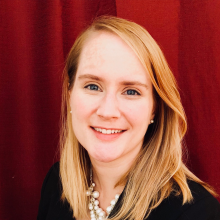February 2019 Spotlight on the SRCD Policy Fellow: Anne Day Leong, Ph.D., M.S.W.
2018-2019 Federal Executive Branch Policy Fellow
I am a second year SRCD fellow at the National Institutes of Health (NIH). My primary placement is in the Eunice Kennedy Shriver National Institute of Child Health and Human Development (NICHD), Office of Science Policy, Reporting, and Program Analysis (OSPRA). The SRCD fellowship has provided me the flexibility to work across NIH, and I have taken full advantage of the opportunity to gain a better understanding of NIH policies and operations across the agency. In addition to working with OSPRA, I have had the opportunity to work within the Office of Legislation and Public Policy (OLPP) at NICHD, the Services Research Branch (SRB) at the National Institute on Drug Abuse (NIDA), and the Office of Research on Women’s Health (ORWH) within the NIH Office of the Director.
At OSPRA, I have primarily been working on the NICHD strategic plan. Specifically, I serve as an analyst on the Strategic Planning Committee which is chaired by the NICHD Director. I provide staff support to meetings and various aspects of the strategic planning process. NICHD is in the midst of a massive effort to incorporate perspectives from internal and external stakeholders to provide feedback on NICHD’s research portfolio and refocus resources to improve the health of the populations NICHD serves. Of the 27 institutes and centers at NIH, NICHD has one of the broadest portfolios of science. To create a strategic plan for a broad span of science, NICHD has spent over a year collecting information from the internal and external scientists, advocacy groups, and the general public. OSPRA and NIH leadership is heading up the task of compiling input on the strategic plan, and pulling it together to create a final document.
I have also gained experience working at the intersection of science and policy through NICHD’s Office of Legislation and Public Policy. OLPP serves as a public liaison for NICHD by handling legislative issues, partnerships, controlled correspondence, and other special projects. Through OLPP, I have been able to provide scientific expertise for draft legislation through the technical assistance process. I have also worked on a number of external facing strategic planning processes, such as a request for information from the public providing feedback on the NICHD strategic plan, and a large public webinar in which the Director of NICHD took questions from members of the public on the strategic plan. Working at OLPP has helped me gain a hands-on understanding of the legislative and appropriations process through attending congressional hearings and answering congressional inquiries.
I have also been fortunate to gain grants management experience working within the Services Research Branch of the National Institute on Drug Abuse. At the SRB, I have been assisting on a portfolio of research examining adolescents and opioid use disorder. Through my work at NIDA, I’ve been able to build on my own expertise in social services, while establishing a solid foundation in grants management and portfolio analysis.
The Office of Research on Women’s Health has also recently completed their strategic plan. At ORWH, I assisted in their strategic planning process by co-leading a team of trans-NIH staff focused on of the evaluation of research that is relevant to women. This “evaluation team” collaborated to create strategic goals for how NIH will identify and track research pertinent to the health of women, and identify gaps and priorities for future research.
I am immensely grateful for the experience SRCD and NIH have provided me through this fellowship. As a social work researcher, I expected my transition to NIH would be a challenge. I have found my expertise provides a new, and valued perspective on the work at NIH and I have learned about the various ways social and behavioral science is welcomed at NIH.
